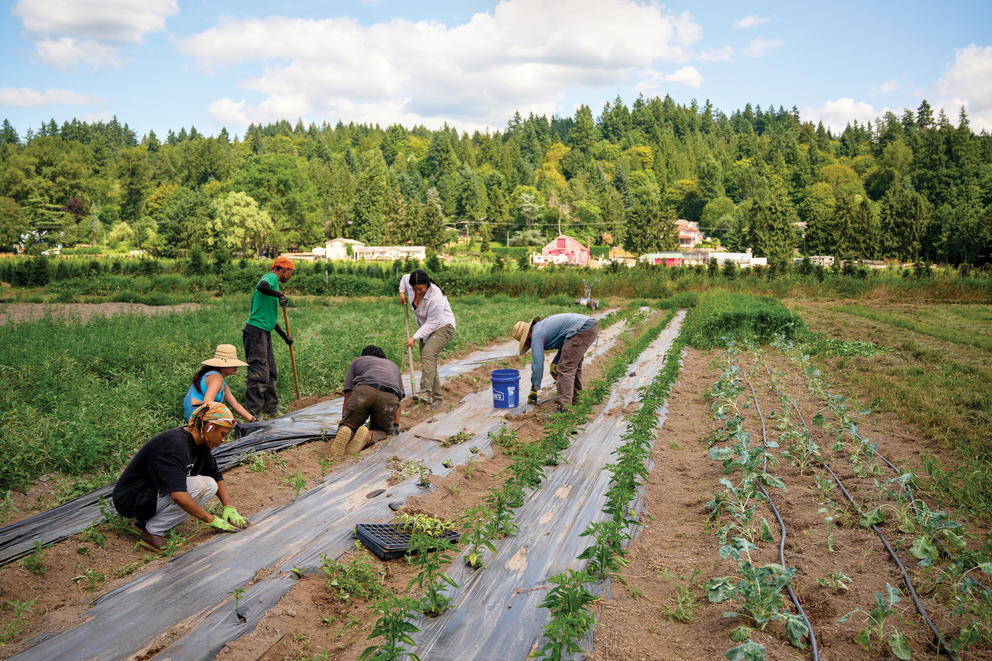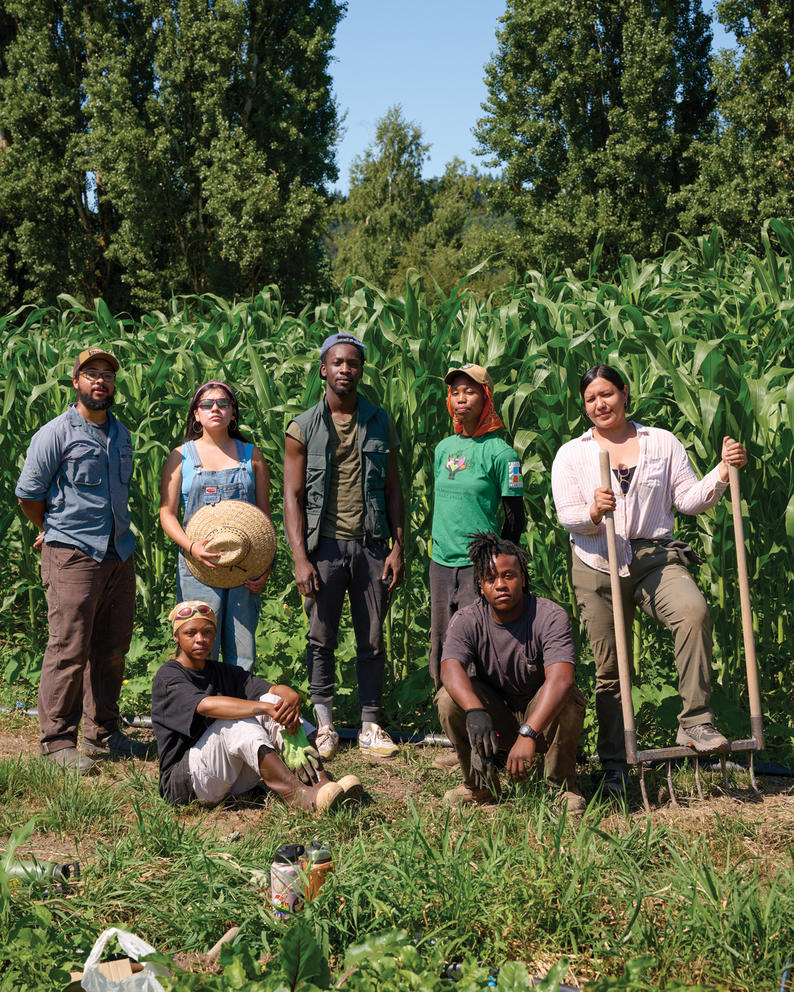Clamoungou stood at the end of a 100-foot-long crop bed studded by the wilting leaves and sagging stalks of the last remaining collards. Transparent tarps nailed to the ends of a half-finished greenhouse whipped in the wind behind him. With his arms spread wide, he dragged in lengths of a pliable black tube — drip tape, used for slow-release watering — that stretched the length of the row, twisting his torso as he doubled the tape over on itself. Next, he planned to mow down the still-standing plants before sowing rye and vetch, cover crops that would hold the soil in place during the wet winter ahead and fix nitrogen and other nutrients in it, ready for the vegetables he’d seed the coming spring.
While the cover crops prepped the land, Clamoungou and his crew prepped themselves, along with the equipment, infrastructure and seedlings they’d need for a successful growing season. Even on a compact farm like Small Axe, which spans only four acres — the national average is 446 acres — there was much to be done: crop rotations to plan, greenhouse doors to finish, a new shed to build.
But as part of the nonprofit Black Farmers Collective, Small Axe is more than just a place for growing food. It’s also a place for growing Black-owned farm-based businesses and helping the collective to fulfill its mission: building a Black-led food system that heals and enlivens Seattle’s Black community. The collective collaborates with Black-led markets and food banks, and brings people together to celebrate life and land, with its farms and farmers at the center of its efforts.
Prior to founding the collective, Ray Williams, its executive director, was involved in two small gardens in central and south Seattle, one of which was tucked behind the Africatown Center for Education and Innovation. Then, in 2018, the Black Farmers Collective formed to establish Yes Farm on a 1.5-acre plot in central Seattle, where organizers host volunteer days, summer cookouts, and food and gardening classes.
In 2020, Williams learned that King County was looking to lease and reactivate fallow farmland in the Sammamish River Valley. Williams and Clamoungou inspected the weed-strewn land, talked about what they could do with it, applied for the lease, and Small Axe Farm was born.
Small Axe helps expand the work the collective began at Yes Farm: addressing the epidemic of food insecurity in Seattle’s Black community. According to data published by Communities Count, a resource offered by Public Health — Seattle & King County, nearly a third of Black Seattleites over 18 experience food insecurity. By partnering with local food banks, Black-led mutual aid networks and other community groups, the collective distributes the food it grows to those most in need.
“That’s one of the things that first brought me into farming,” Clamoungou said, “having a tangible result at the end of the work, something that literally feeds the body and feeds the souls of people.”
Beyond that, Small Axe is a space where Black food entrepreneurs can grow their businesses and prepare to one day own their own land. Getting land into the hands of Black farmers is crucial to the collective’s mission because of centuries of dispossession: Despite being the soul, spine and driving force of the early American economy, formerly enslaved African Americans struggled to acquire and hold onto land post-Emancipation.
Black people never received any land-based reparations — the commonly quoted 40 acres and a mule. Still, W.E.B. Dubois estimated that in 1875, Black farmers owned 3 million acres, less than 1% of the total farmland recorded in the 1870 agricultural census. At the time, the population of the United States was 12.6% Black.
By 1910, Black ownership of farmland had risen to 16 million acres, or just under 2% of all farmland; that year, Black people made up more than 10% of the population. But just over a century later, by 2017 — the year of the most recent agricultural census — Black farmers had lost most of that slim gain, owning now just 0.5% of all farmland, even though Black people total over 14% of the population. Black folks lost their land not because they lacked the facility or desire to farm, but because of wanton racial violence, predominantly in the South but also throughout the Lower 48.
White mobs numbering in the hundreds and thousands dragged Black people through the streets and murdered them. White mobs hung Black people from trees, riddled Black bodies with bullets, raped Black women, burned Black men alive, drowned Black children, beat Black people to death and cut Black bodies to bits for souvenirs. These domestic terrorists drove millions of Black folks to flee north and west in what became known as the Great Migration.
But escaping the South didn’t mean escaping white supremacy. Across the country, white people weaponized the economy against Black farmers in a strategic and systematic effort to force them off their land. In a 2022 study titled “Black land loss: 1920-1997,” University of Massachusetts Boston economist Dania Francis and her co-authors detail the tactics used against Black farmers and their lasting impact. Many banks refused to loan money to Black farmers, making investments in infrastructure upgrades and maintenance all but impossible.
When loans were granted, according to the study, “another common tactic was for a federal agent to delay a loan in order to cause a farmer to plant late, reap a smaller harvest, and end up in debt.” Black farmers were excluded from the federal payments and locally administered low-interest loans designed to support farmers during the Great Depression. And despite the passage of the 1964 Civil Rights Act, discrimination against Black farmers persists.
All told, Francis and her colleagues estimated the value of the land and wealth Black farmers lost between 1920 and 1997 at $326 billion, adjusted for inflation — still just a sliver of the estimated $10 trillion racial wealth gap.
The Black Farmers Collective works to bridge a tiny portion of this chasm. That includes hiring local Black chefs to cater Yes Farm cookouts, participating in the South Seattle Community Food Hub in Seattle’s historically Black neighborhoods, teaching farmers new growing techniques, connecting them with markets and produce buyers and setting aside plots for new farmers from the community.
This is an important boon for farmers who would otherwise struggle to access land around Seattle. Nationwide, an average acre of farmland costs $3,800; in King County, it’s $35,000. And aspiring homeowners are on the hunt for parcels, too. “You’re competing with someone that wants to put a house on four acres and is willing to pay for it,” Williams said.
In such a cutthroat environment, one of the best ways for new, low-income farmers to access land is with support from the county government. Since the 1980s, King County has acquired over 15,000 acres of agricultural land and redistributed it through its Farmland Leasing Program, which is how the Black Farmers Collective acquired Small Axe.
This year, along with the collective’s staff, Small Axe is home to four Black farmers who are growing hot peppers, cabbage, sweet potatoes, artichokes and other crops on their own plots. Clamoungou and Williams were excited about the community sprouting alongside the crops at the farm, where growers can encourage each other and share lessons from successes and missteps alike. As Clamoungou put it, “That’s what we need: more farmers, not more software engineers.”
Another Small Axe grower chimed in: “No farmers, no life.”
This story was originally published by High Country News and is republished with permission




